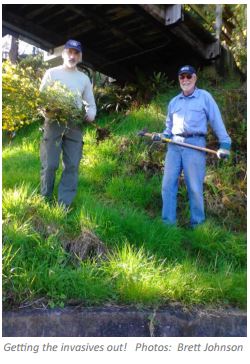By Brett Johnson
Pierce County’s own Ivy League
For many years now, Tatoosh Group members have worked to remove invasive plants from parks in Tacoma. Known informally as the Ivy League, the group has traditionally focused on removing English ivy from forested areas, such as Point Defiance Park and Snake Lake Nature Preserve.
Ivy is notorious for smothering the forest floor and preventing native plant communities from thriving. It can even kill large trees by climbing and surrounding limbs, causing them to become more susceptible to blow-down.
The Ivy League is now expanding its work to other areas of Tacoma and Pierce County. In addition to conducting follow-up visits at previous infestation sites, the group is now removing ivy in McKinley Park, with stewardship provided by Sierra Club member Jori Adkins. Prior to the Tatoosh Group’s involvement, Jori and others familiar with the park witnessed an amazing renaissance in its condition. Group members are helping with this rebirth by clearing ivy-infested areas to make way for native plantings.
Morphing into the Legion of Broom
Expanding efforts, with stewardship provided by Brett Johnson, the group has begun removing Scotch broom and invasive blackberry species at Parkland Prairie. This work is aimed at protecting a revitalized channel for Clover Creek with recently planted native species and mounds reminiscent of the Mima Mounds, south of Olympia.
In some places along the creek bed, the Scotch broom has grown so thick it has overtaken both native prairie plants and riparian vegetation. Now with a new moniker, the Legion of Broom aims to gradually remove the Scotch broom using tools known as weed wrenches, which have been provided by Pierce County Parks to facilitate the restoration of the prairie.
Clearing the path for native landscapes
This season, the Ivy League and the Legion of Broom have already accomplished a lot — with two visits to Parkland Prairie and three to McKinley Park. Work parties are held for about three hours on one Saturday morning per month. During each visit, a great deal of invasive plant material is removed, and it is exciting to see the progress made by the end. The task seems daunting at first, but by dividing sites up into manageable sections, it is possible to set and meet goals.
Maintaining this level of commitment over the next decade, the group can accomplish the objectives that have been set. And the Tatoosh group is not in this fight alone — other volunteers have joined the efforts too, from caring neighbors to committed local students.
Hopefully, this work will inspire other Sierra Club groups around Washington State to get involved in removing invasive species and restoring native plant communities at the local level. Working to restore the native beauty of parks and open spaces is a wonderful way to fulfill Sierra Club’s mission "to educate and enlist humanity to protect and restore the quality of the natural and human environment."
For more information about the work Pierce County’s Invasive Species Initiative, contact Brett Johnson.